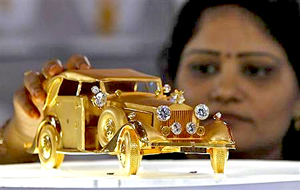 London, Nov 14: Global gold demand fell to its lowest in nearly five years in the third quarter as Chinese buying slid by a third, the World Gold Council said on Thursday, putting it back behind India as the world's biggest gold consumer.
London, Nov 14: Global gold demand fell to its lowest in nearly five years in the third quarter as Chinese buying slid by a third, the World Gold Council said on Thursday, putting it back behind India as the world's biggest gold consumer.
Total gold demand fell 2 per cent to 929 tonnes in the third quarter, the data, prepared in conjunction with GFMS analysts at Thomson Reuters, showed. That is the lowest since the last three months of 2009.
Last year's number one consumer China saw a 39 per cent drop in jewellery consumption as well as a 30 per cent fall in bar and coin investment. Combined demand fell 37 per cent.
India once again took over as the world's biggest gold consumer, buying 225.1 tonnes of gold jewellery, coins and bars last quarter, compared to 182.7 tonnes in China.
India, which lost its crown as the leading gold buyer to China in 2011, saw a 60 per cent surge in jewellery demand in the third quarter.
"Our forecast for the full year is the same for both India and China. We expect demand in both to come in at between 850-950 tonnes," Alistair Hewitt, head of market intelligence at the World Gold Council, said. "Both remain very positive pillars of gold demand."
Demand for gold snowballed in the wake of the financial crisis that followed the collapse of Lehman Brothers in 2008, as investors sought the metal as a portfolio diversifier and safe store of value.
It peaked in 2011 at 4,702 tonnes, but had fallen to 4,080 tonnes by last year. Prices XAU=, which crashed 28 per cent last year, have fallen another 3.3 per cent in 2014. This year the WGC expects gold demand to stabilize.
"We expect gold demand to be largely similar to last year, at between 4,000-4,100 tonnes," said Hewitt.
The third quarter marked the seventh consecutive quarter of outflows from exchange-traded funds. Holdings of the vehicles, which issue securities backed by physical gold, fell 41.3 tonnes last quarter, the data showed.
Global demand for gold jewellery, the biggest single area of consumption, fell 4 per cent to 534 tonnes.
Among supply sources, mine production rose 1 per cent to 812 tonnes, while scrap supply fell 25 per cent to 250.5 tonnes. Year to date, 2014 has seen the lowest level of recycling since 2007, the WGC said.





Comments
Add new comment